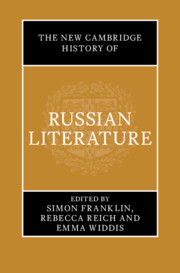Book contents
- The New Cambridge History of Russian Literature
- The New Cambridge History of Russian Literature
- Copyright page
- Contents
- Figures
- Contributors
- Acknowledgements
- On Transliteration, Names, and Dates
- Introduction
- History 1 Movements
- History 2 Mechanisms
- History 3 Forms
- 3.1 Forms before Genres
- 3.2 Folk Genres
- 3.3 Verse I
- 3.4 Drama I
- 3.5 The Novel I
- 3.6 The Short Story
- 3.7 Drama II
- 3.8 Verse II
- 3.9 The Novel II
- 3.10 Self-Writing
- 3.11 (Plat)forms after Genres
- Boxes 5 Critical Frames
- Boxes 6 Literature beyond Literature
- History 4 Heroes
- Index
- References
3.9 - The Novel II
from History 3 - Forms
Published online by Cambridge University Press: 31 December 2024
- The New Cambridge History of Russian Literature
- The New Cambridge History of Russian Literature
- Copyright page
- Contents
- Figures
- Contributors
- Acknowledgements
- On Transliteration, Names, and Dates
- Introduction
- History 1 Movements
- History 2 Mechanisms
- History 3 Forms
- 3.1 Forms before Genres
- 3.2 Folk Genres
- 3.3 Verse I
- 3.4 Drama I
- 3.5 The Novel I
- 3.6 The Short Story
- 3.7 Drama II
- 3.8 Verse II
- 3.9 The Novel II
- 3.10 Self-Writing
- 3.11 (Plat)forms after Genres
- Boxes 5 Critical Frames
- Boxes 6 Literature beyond Literature
- History 4 Heroes
- Index
- References
Summary
This chapter examines the history of the Russian novel after 1900 as a cyclical reworking or recycling of two traditions stretching back to the nineteenth century. The first, harmonious tradition is associated with Aleksandr Pushkin, Ivan Turgenev, Ivan Goncharov, and Lev Tolstoi, while the second, disharmonious one follows the examples of Nikolai Gogol, Nikolai Leskov, and Fedor Dostoevskii. The Modernist novel inherited the second trend in the early twentieth century, while the Socialist Realist novel tried to inherit the first one thereafter. The post-Stalinist critical novel combined both trends, and more recently the Postmodernist novel has thrived on a programmatic break from national traditions. In turn, this liberation has coincided with the end of literocentrism in Russia, as the novel has ceased to be the repository and domain of national identity, and instead become an arena for play, fantasy, imagination, modelling, and learning – a space of freedom.
Keywords
- Type
- Chapter
- Information
- The New Cambridge History of Russian Literature , pp. 607 - 623Publisher: Cambridge University PressPrint publication year: 2024

